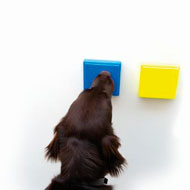Assistance dogs to use household appliances

New technology could cut the amount of time it takes to train assistance dogs.
Assistance dogs may soon be able to operate doors, lights and household appliances thanks to new technology developed by scientists.
A research team from the Open University worked alongside Dogs for the Disabled to develop prototype buttons to help dogs open doors and drawers and press buttons.
It is hoped the new technology could make it easier for dogs to assist humans, whilst dramatically reducing the amount of time it takes to train assistance dogs. As the set of buttons can be installed in the home, researchers say this cuts down the amount of relearning the dog has to do in its new home.
The prototype is currently on display at the Royal Society Summer Science Exhibition which opens today (July 1) in London. Visitors to the free event will be able to watch dogs using the technology.
To help people understand the challenges faced by working dogs, visitors will be able to carry out tasks using "doggy vision" goggles and boxing gloves imitating paws.
The Technology for Dogs exhibit will also showcase other devices in development, such as the new diabetes alarm developed in partnership with Medical Detection Dogs.
The exhibition is open to the public free of charge and runs from today until Sunday, July 6.



 The Veterinary Medicines Directorate (VMD) is inviting applications from veterinary students to attend a one-week extramural studies (EMS) placement in July 2026.
The Veterinary Medicines Directorate (VMD) is inviting applications from veterinary students to attend a one-week extramural studies (EMS) placement in July 2026.